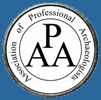Code of Ethics
In accordance with the constitution of the Association, acceptance of a code of ethics and standards is required of all members. Adherence to this code is intended to maintain a high standard of research and conduct by the Association. Membership in any other society or organization is precluded only where the stated objectives of such groups are in clear violation of the ethical code of the Association.
Section 1.
Responsibilities of Members as Archaeologists
- To support the terms of the UNESCO convention regarding illegal import, export, or transfer of ownership of cultural property, as passed by the General Conference, 14 November 1970, Paris.
- To abide by all other Federal and Provincial statutes where these apply to the practice of archaeology or treatment of archaeological materials both in Canada and elsewhere.
- To respect and encourage the interests of native groups in their heritage and consult with recognized descendant groups or their representatives in any situations involving treatment of human remains.
- To respond to public requests for information or educational materials wherever this is possible and consonant with the code of the Association.
- To accurately document such qualifications as may be required for membership in the Association and for accreditation in particular research skills.
Section 2.
As professional archaeologists, members will adhere to certain principles of conduct.
2.1
- Demonstrate a high level of integrity in their work, represent research results as accurately and completely as possible, and give full and proper credit for work done by others.
- Encourage contact with other professionals on issues of mutual concern, including not only research but questions of ethics and legislative impact on archaeological resources.
- Exercise diligence in the reporting of research results in accordance with existing statutes and make every reasonable effort to disseminate research results to the public and profession.
2.2
Archaeologists periodically find themselves in situations of uncertainty or ambiguity as to a proper course of action. Members shall:
- Report violations of the code of ethics or of existing statutes to appropriate authorities. In the case of ethics violations, a report shall be made to the Chair of the Ethics and Standards Committee who will appoint APA members to serve on an investigative committee. This committee will make recommendations to the Executive.
- Declare conflicts of interest to the Executive or such other persons or organizations as may be involved prior to accepting employment or positions of responsibility and on any subsequent occasion where such conflicts may arise.
- Protect archaeological resources through conservation efforts recognizing that excavation retrieval or other accepted practices are not the only avenues of protection.
- When continuance of research is not possible or a full scientific report has not been published ten years from its commencement, field data shall be made available to other researchers.
Section 3.
In their employment, members shall recognize certain obligations as professional archaeologists
3.1
- To uphold all legal and ethical requirements of the profession as stipulated in Sections 1 and 2.
- To recognize the confidentiality of client or employer information where this is consistent with the code and existing statutes and to refrain from using such information for personal gain.
- To recommend appropriate methods and personnel for archaeological projects in a manner which is consistent with informed archaeological practice and free of prejudice.
- To ensure that only qualified personnel or adequately supervised individuals are employed and that qualifications of staff members meet professional standards for every project.
- Engage only in archaeological work for which they are qualified and consult with other qualified archaeologists or specialists where particular problems are anticipated or may be encountered.
- Advise employers and employees of acceptable research standards and potential ethical or legal concerns or conflicts of interest.
Section 4.
Research standards of members as professional archaeologists shall include:
4.1
- Adequate preparation for field research including review of previous work, personal assessment of training required to undertake intended research, of funding and equipment required to initiate and maintain any project, and careful consideration of the scientific plan of research.
- Provision of basic facilities for field and laboratory research as determined by project requirements and common practice.
- Adherence to existing statutes regarding safety in the workplace and other conditions of employment.
- Maintaining the integrity of archaeological materials and records, providing for public display and research, and arranging long term disposition.
- Adherence to basic guidelines for survey and excavation is stipulated by legal statutes regulating archaeology.
- Adherence to the Borden site designation scheme for purposes of site identification and cataloguing of archaeological materials found in Canada.

